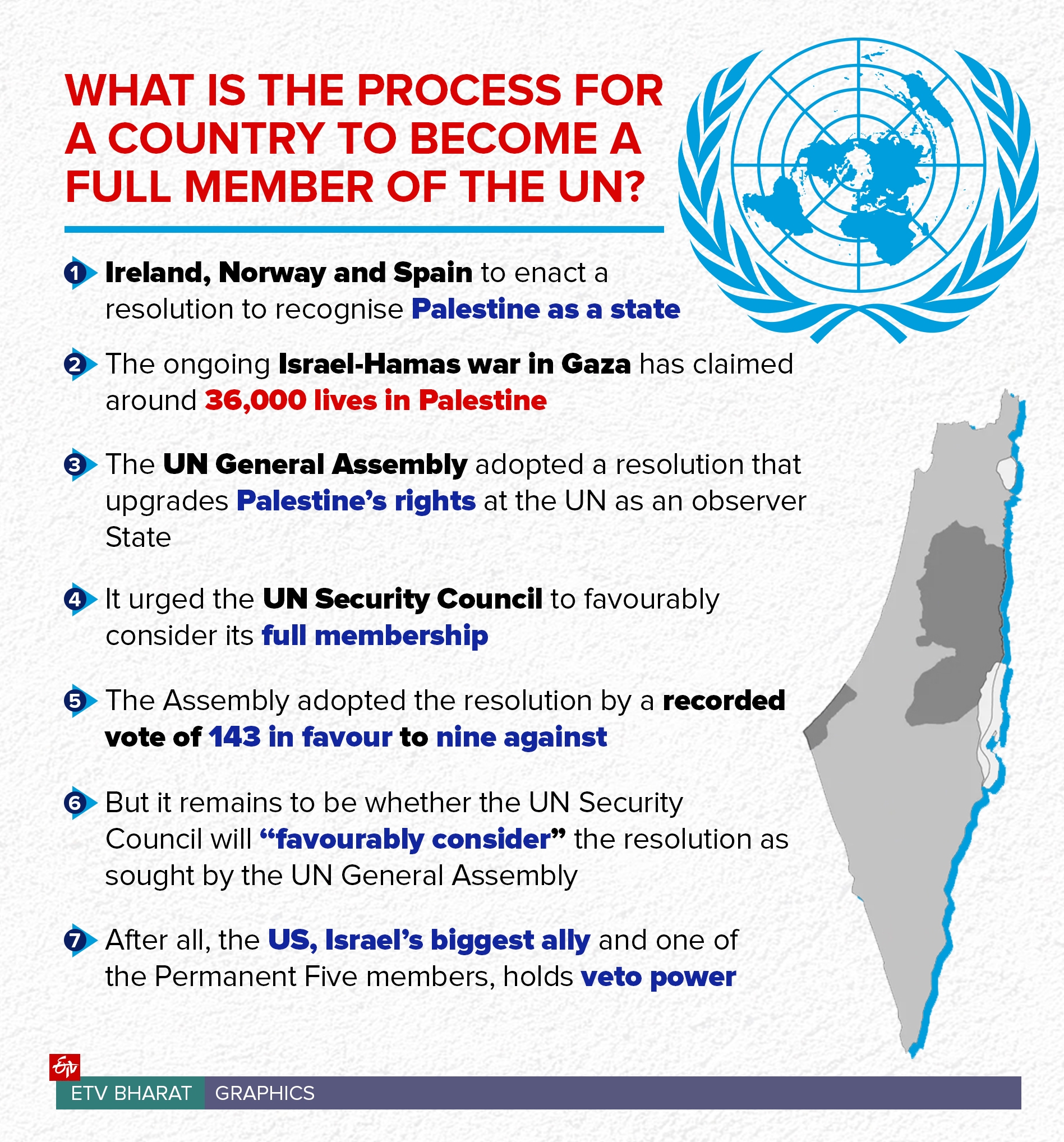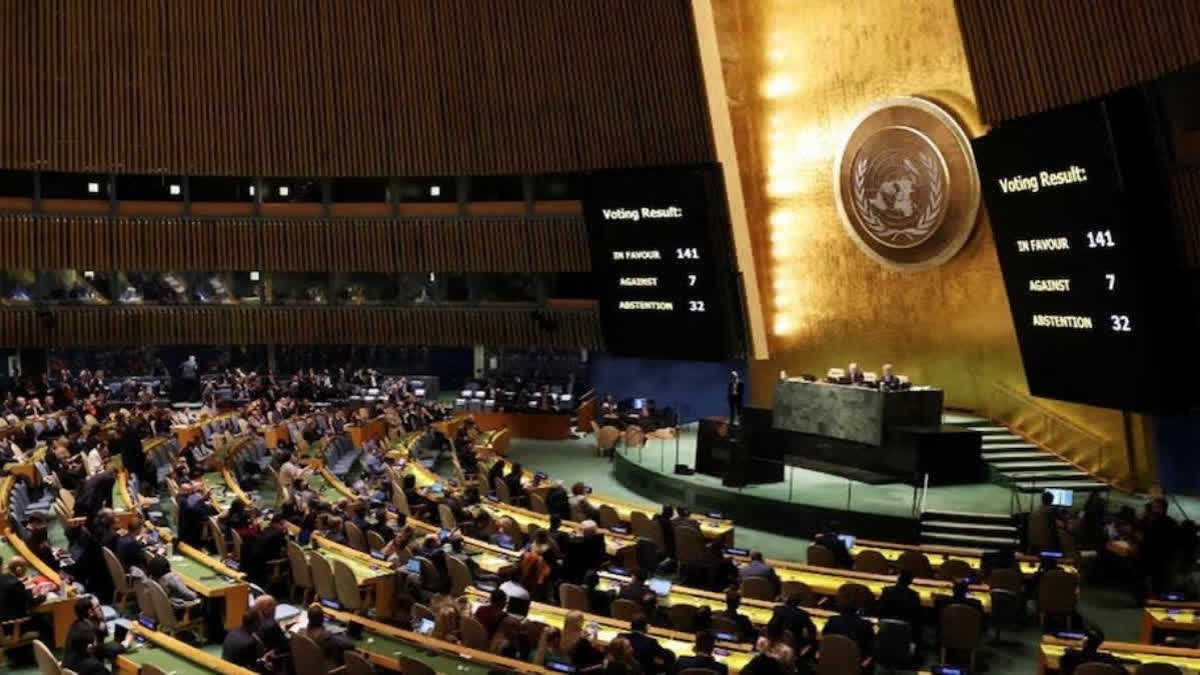New Delhi: Three days from now, on May 28, the European nations Ireland, Norway and Spain will enact a resolution to recognise Palestine as a state. This comes amidst the ongoing Israel-Hamas war in Gaza that has claimed around 36,000 lives in the Palestinian enclave on the east coast of the Mediterranean Sea.
According to Norwegian Prime Minister Jonas Gahr Store, a two-state solution is in the best interests of Israel and the only way to come out of the conflict.
“We hope that our recognition and our reasons contribute to other Western countries to follow this path, because the more we are, the more strength we will have to impose a ceasefire,” Spain’s Prime Minister Pedro Sanchez was quoted as saying.
Ireland’s Prime Minister Simon Harris, too, exuded confidence that other nations would follow suit and recognise Palestine as an independent state.
The three European nations’ decision came in the wake of a UN General Assembly resolution earlier this month in which member states voted overwhelmingly in favour of upgrading Palestine’s status in the world body from that of an observer state to that of a full member.
But, the path to getting international recognition as an independent country and full membership of the UN is fraught with challenges.

When is a territory or region internationally recognised as an independent state?
The first step towards statehood is typically a formal declaration of independence by a territory or region seeking to establish itself as a sovereign state. This declaration outlines the legal basis for the claim to statehood and the desire for self-governance.
According to the Montevideo Convention on the Rights and Duties of States (1933), an entity must possess the following qualifications to be considered a state:
Defined territory: The aspiring state must have a clearly defined geographical area over which it exercises effective control.
Permanent population: There must be a stable population residing within the claimed territory.
Government: The entity must have an organised government capable of exercising authority and maintaining legal order within its territory.
Capacity to enter into relations with other states: The aspiring state must demonstrate its ability to engage in diplomatic relations and adhere to international law.
Admission to international organisations, such as the UN, is often seen as a significant indicator of statehood.
What is the process for a country to become a full member of the UN?
The UN Security Council must introduce a resolution recommending a particular country to be given full membership in the world body. For the resolution to prevail, it would need backing from at least nine out of the 15 Security Council members, without opposition from any of the five permanent members: China, France, Russia, the UK and the US.
Should the resolution manage to succeed at the Security Council level, it would then proceed to the UN General Assembly for a vote. Achieving passage would necessitate garnering a two-thirds majority among General Assembly members.
What happened in the case of South Sudan, the world’s youngest country and the 193rd member of the UN?
Sudan gained independence from British-Egyptian rule on January 1, 1956. However, the new nation was dominated by the Arab-Muslim population in the north, leading to tensions with the predominantly African-Christian and animist population in the south.
Even before independence, these tensions had erupted into the First Sudanese Civil War (1955-1972), primarily driven by southern resistance to northern dominance and attempts at imposing Arab and Islamic culture on the region.
The conflict ended in 1972 with the Addis Ababa Agreement, which granted the South regional autonomy. However, this peace was short-lived, as disputes over resources and governance eventually led to its breakdown.
In 1983, the Second Sudanese Civil War began when President Gaafar Nimeiry’s government imposed Sharia law across the country, including the south. This reignited southern resistance, led by the Sudan People's Liberation Army (SPLA) under John Garang. The war caused immense suffering, with millions of deaths and displacements, drawing international attention to the dire humanitarian situation.
Prolonged negotiations, facilitated by international actors, led to the Comprehensive Peace Agreement (CPA) in 2005. Key provisions included autonomy for the South, power-sharing, and a future referendum on independence.
The CPA established a six-year interim period during which the Government of Southern Sudan was formed, allowing for self-governance while preparing for the independence referendum. On January 9, 2011, the referendum was held, with an overwhelming majority (98.83 per cent) voting in favour of secession. The vote was widely regarded as free and fair, with significant international observation.
On July 9, 2011, South Sudan declared its independence from Sudan, becoming the world’s newest country, with Salva Kiir Mayardit sworn in as the first president.
On July 9, 2011, the same day it declared independence, South Sudan applied for membership to the UN. In accordance with Article 4 of the UN Charter, the Security Council had to consider South Sudan’s application and make a recommendation to the General Assembly. On July 13, 2011, the Security Council unanimously adopted Resolution 1999, recommending that the General Assembly admit South Sudan as a new member state.
Following the Security Council's recommendation, the General Assembly convened on July 14, 2011, to consider South Sudan's application for membership. The General Assembly voted overwhelmingly in favour of admitting South Sudan as the 193rd member state of the UN, with 119 member states voting in favour, and none against.
The process of South Sudan’s admission to the UN was relatively swift, given the widespread international recognition of the country’s independence and the support it received from the international community. South Sudan’s membership was seen as an important step in its nation-building process and in its efforts to establish itself as a stable and democratic country.
Compared to South Sudan, what are the challenges Palestine faces in getting international recognition as an independent state and full membership of the UN?
The challenges Palestine faces in achieving international recognition as an independent state and full UN membership are deeply rooted in historical conflicts, geopolitical complexities, and international diplomacy.
The State of Palestine attained observer status within the UN General Assembly in November 2012. Previously, the Palestine Liberation Organisation (PLO) had formally declared the State of Palestine on November 15, 1988, asserting sovereignty over the internationally recognised Palestinian territories: the West Bank, including East Jerusalem, and the Gaza Strip. By the close of 1988, 78 nations had recognised the Palestinian state.
In an effort to resolve the enduring Israeli-Palestinian conflict, the Oslo Accords were signed between Israel and the PLO in 1993 and 1995, establishing the Palestinian Authority (PA) as a self-governing interim administration in the Gaza Strip and approximately 40 per cent of the West Bank. However, negotiations between Israel and the PA stalled following the assassination of then Israeli Prime Minister Yitzhak Rabin and Benjamin Netanyahu’s rise to power, prompting Palestinians to pursue international recognition of the State of Palestine without Israeli consent.
In 2011, Palestine gained entry into UNESCO. Subsequently, in 2012, it was granted observer status within the UN General Assembly with the support of 138 member states. This milestone prompted the PA to officially adopt the name “State of Palestine” for all purposes.
The observer status in the UN, while falling short of full membership, allows Palestine to participate in UN debates, join certain UN bodies and international conferences, and gain access to the International Criminal Court (ICC). This status also provides a degree of legitimacy for Palestine to establish diplomatic relations with other states.
While Palestine is not a full member of the UN, it has been recognised as an independent state by a significant number of countries, mainly in Asia, Africa, and Latin America. These bilateral recognitions give Palestine the legal basis to establish diplomatic missions in those countries, including India.
In 1988, India became one of the first countries to recognise the Palestinian State. In 1996, India opened its Representative Office in Gaza, which was later shifted to Ramallah in 2003.
“However, India’s Representative Office in Ramallah is officially a part of the Indian Embassy in Israel,” a former Indian diplomat explained to ETV Bharat on the condition of anonymity. “Though India’s Representative Office in Palestine operates with some degree of independence, the fact of the matter is that countries wishing to open representative offices in Ramallah can do so only with the permission of Israel.”
Now, with Ireland, Norway and Spain set to recognise Palestine as a state, Palestine can open diplomatic missions in these countries. However, it remains to be seen whether Israel will allow these three European nations to open diplomatic missions or representative offices in Ramallah.
On May 10, the UN General Assembly adopted a resolution that upgrades Palestine’s rights at the UN as an observer State, urging the UN Security Council to favourably consider its full membership.
The Assembly adopted the resolution titled “Admission of new Members to the United Nations” by a recorded vote of 143 in favour to nine against (Argentina, Czech Republic, Hungary, Israel, Federated States of Micronesia, Nauru, Palau, Papua New Guinea, United States), with 25 abstentions. By its terms, it determined that the State of Palestine is qualified for membership in the UN in accordance with Article 4 of the Charter of the United Nations and should, therefore, be admitted to membership in the world body.
But it remains to be whether the UN Security Council will “favourably consider” the resolution as sought by the UN General Assembly. After all, the US, Israel’s biggest ally and one of the Permanent Five members, holds veto power.
And that is how the approaches of Palestine and South Sudan towards international recognition as an independent country and full membership of the UN contrast.


